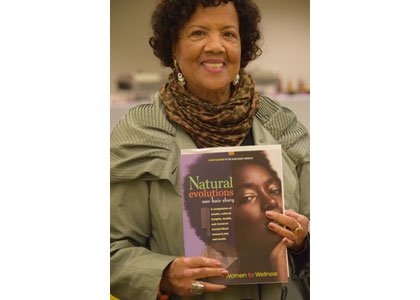Products marketed to black women are largely untested, unlabeled and unregulated with toxins and carcinogens that lead to hormone disorders, reproductive health challenges and contribute to obesity rates and aggressive cancers. Hair care professionals, with prolonged exposure to beauty products, face reproductive health issues including increased risk of infertility and miscarriage compared to other professions.
These were among the disturbing findings listed in a report entitled, “Natural evolutions: one hair story,” recently released by Black Women for Wellness (BWW). The report outlines the health risks faced by black women and girls due to a lack of federal oversight and regulation of hair care and beauty product manufacturers.
BWW promotes the health of black women and girls in California through education and advocacy, working closely with legislators and members of the Los Angeles community.
“In 2009, we found out that the beauty industry was not regulated and that chemicals in products could negatively impact the health of black women,” said Teni Adewumi, Environmental Justice Program Coordinator for Black Women for Wellness. “From there, we began to do more research into health impacts of toxic chemicals and wanted to really look at how that was impacting the health of Black women and girls. Since salon workers not only use these products on themselves and on clients, we figured that they would be an overexposed group that needed to be looked at.”
According to Adewumi, over 100 participants took part in their research, which consisted of focus groups, surveys, and in-depth interviews.
“Methodology in choosing participants included attendees at hair shows, community members that came to our different events, and those we met during our regular outreach,” she said. “We canvassed the area and spoke with as many salon workers and owners as we could.”
BWW says it seeks to equip black women and girls with tools to make decisions about their own lives and bodies, and to advocate for improved reproductive health care access.
“We are seeing beauty professionals burdened with long-term, severe health impacts from exposure to toxic chemicals at work,” said Adewumi. “Professionals should be equipped with the information and education they need to make informed decisions about hair care products. If not, how can they protect themselves and their clients?”
The report noted that as a result of the sustained use of and exposure to toxic chemicals found in many hair care and beauty products over their lifetimes, both consumers and professionals face potentially devastating health consequences. The report noted that during a focus group of black hair care professionals, a participant said, “After 20 years in the beauty industry, my friends have no fingerprints. They literally cannot go to the DMV; put their hands down and have a scan.”
According to Adewumi, such damages originate “from the use of corrosive products that damages the hands.”
Adewumi is a PhD student in Industrial Hygiene at the UCLA Jonathan and Karin Fielding School of Public Health. She completed a Bachelor of Science in Environmental Health Sciences at California State University, San Bernardino and a Masters of Science in Environmental Health Sciences at UCLA.
Nourbese Flint, program manager, Black Women for Wellness, also participated in a recent teleconference with Adewumi to discuss the report.
“The hair care and beauty products marketed to women are grossly unregulated— lacking proper testing or labeling,” said Flint. “Failing to prohibit the use of toxins in these products— or at least requiring that these toxins be disclosed to consumers via product labels— is dangerous and detrimental to women’s health.”
Flint has a Masters of Arts in Women’s Health from Suffolk University, where she specialized in health disparities as it relates to media influence. She is also a graduate of San Jose State University, where she majored in Broadcast Journalism and African American Studies.
The report is calling for federal regulation of Black hair care product manufacturers.
“We are trying to make families safe in an unregulated market,” said Flint.
For more information about BWW or the report, visit: bwwla.org
